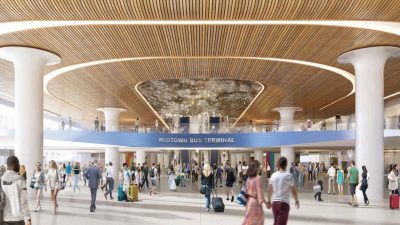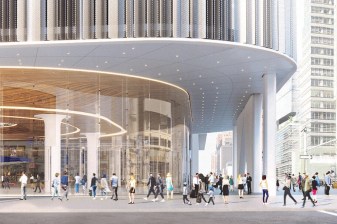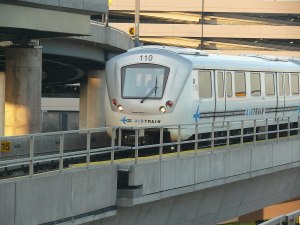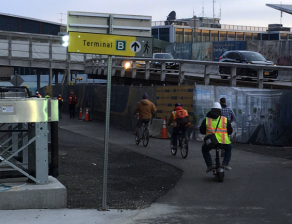Does a New Port Authority Bus Terminal Really Cost $11 Billion?
It hit this morning’s headlines with a thud: Replacing the aged, overburdened Port Authority Bus Terminal will cost up to a staggering $11 billion, according to a plan to be presented to the Port Authority’s board on Thursday. But is that figure based in reality?
Advocates are skeptical and wary that the cost is being inflated in a bid to stop the project before it can get off the ground.

The cost projection might seem par for the course to New Yorkers jaded by the region’s out-of-control construction costs. But let’s put things in perspective: The reported size of the bus terminal replacement is about the same as the combined cost of three of the Port Authority’s other major capital projects: the $1.5 billion PATH extension to Newark Airport, the $3.6 billion rehabilitation of LaGuardia Airport, and Santiago Calatrava’s $3.9 billion WTC transit hub.
The big difference between those projects and the new bus terminal? They’re actually in the Port Authority’s capital plan. The bus terminal revamp, however, doesn’t appear to have political support from either New York Governor Andrew Cuomo or New Jersey’s Chris Christie, the two men in charge of the bi-state agency. (Cuomo, for example, didn’t mention it in his infrastructure speech earlier this year.)
That might help explain how the Port Authority reached such outlandish cost projections, says Tri-State Transportation Campaign Executive Director Veronica Vanterpool.
“There’s a tendency to over-inflate transit costs just to kill them,” she said. Christie, of course, famously overstated the cost of the ARC Tunnel in his quest to derail the project, and Cuomo inflated the cost of bus lanes on the Tappan Zee Bridge in his rush to build a new crossing.
The Port Authority refused to comment on the cost estimates, only saying that they would be released to the board on Thursday. “We look forward to updating the board on this critical project,” said spokesperson Chris Valens, “and continuing to engage the public and other stakeholders on ways to improve the bus passenger experience in the region and meet the demands of the future.”
Until now, the Port Authority’s numbers for the bus terminal had been much more modest.
Since last year, the authority had been planning $263 million in upgrades to the existing facility, paying for things like new air conditioning, electrical work, and a relocated control center. Initially, the authority had just $173 million for the bus terminal in its capital plan, but public pressure pushed the authority to trim from other projects and allocate an additional $90 million to the bus terminal upgrades in the capital plan.
The Port Authority is also interested in building a bus garage to cut down on traffic from empty buses returning to New Jersey during the day before coming back to New York to pick up evening commuters. That project, mothballed during the 2009 budget crunch and last estimated at $400 million, remains on shaky ground after it failed to win a $230 million federal grant last fall.
Ultimately, the bus terminal needs more than new air conditioning and a layover garage. At peak hours, it handles as many passengers as Grand Central Terminal and carries as much cross-Hudson traffic as PATH and NJ Transit rail combined. It’s bursting at the seams, and projected passenger growth — a 35 to 51 percent increase by 2040 — cannot be accommodated in the existing facility.
Before last July’s board meeting, commissioners coalesced around eventually tearing the current terminal down and building a new one from scratch. At the time, Port Authority officials said the cost of a new terminal would come in at $1 billion or more.
Port Authority commissioner Kenneth Lipper, an outspoken New York appointee who has championed bus terminal improvements, urged his colleagues to put the project into the capital plan. “Let’s make this a tangible thing. Let’s find the money for it. And let’s just get on and do it,” he said at a July meeting of the capital planning committee. “Put the bus terminal into the plan… [so] this will become a real project.”
Other commissioners wanted to hold off on committing to the new bus terminal until the results of a bus master plan, underway since 2012, were available. The board eventually voted for a resolution that delayed action until the plan was released and also asked the master plan to prioritize a complete replacement of the bus terminal, possibly moving it to a new location.
The study’s preliminary results are due this week, and that’s where the shocking $11 billion price tag appears to come from.
“I think the public has to be very diligent in looking at the numbers,” Vanterpool said. “I’m just raising flags, like lots of people are, that they’re affixing this enormous price tag to it, and then everyone’s going to say that we can’t move forward with it. And that’s a concern.”
It looks like the governors’ hold over the Port Authority is unlikely to loosen anytime soon. On Monday, the New Jersey Senate failed to override Christie’s veto of a bill to reform the authority. An effort to override Cuomo’s veto also appears to have stalled in Albany.



